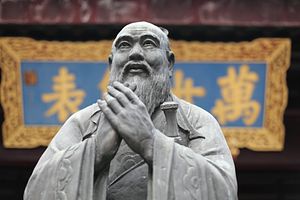To explain the present, the Communist Party of China (CPC) often turns to the past. One of its favorite pastimes is to deploy China’s decorated history and the wisdom of its ancients to explain its policies and bolster its authority.
For example, the CPC frequently offers the (largely nonviolent) 15th century maritime voyages of Zheng He, who projected Chinese power and carried Chinese treasure to destinations as far flung as the Middle East and Africa, to support the notion of its “peaceful rise” in the 21st century. For his part, Mao was fond of quoting Sun Tzu and the Chinese classic Three Kingdoms, and today Xi Jinping keeps a rolodex of wise sayings from political philosophers at the ready.
Despite the homage paid to these leading lights, Beijing’s behavior is growing increasingly at odds with much of their counsel. That is to the detriment of China and the world.
Many of China’s most prominent political philosophers, including Guanzi, Laozi, Confucius, Xunzi, and Mencius, held that governing with humane authority—“winning the hearts and minds of the people at home and abroad”—was the key to becoming a leading world power, as Yan Xuetong points out in his book Ancient Chinese Thought, Modern Chinese Power. In terms of its foreign policy, China has been doing little of this lately.
On the Korean peninsula, China continues to subsidize the tyranny of the Kim regime by serving as Pyongyang’s economic lifeline. In particular, its policy of forcibly repatriating defectors from North Korea is an exercise in inhumane authority. This practice also violates international law, which holds that refugees cannot be repatriated to “conditions of danger.” And yet, China has marched tens of thousands of refugees back to the loving care of the fatherly leader, where they and their families face torture, labor camps, or execution. As a result, a landmark UN Commission of Inquiry report warned that China could be “aiding and abetting crimes against humanity.”
China argues that defectors are economic migrants, not refugees, a position that would provide legal cover for its repatriation policy. But that stance has been roundly rejected by the UN Human Rights Council, Committee Against Torture, Convention on the Rights of the Child, and the landmark 1951 Refugee Convention. On paper, China is a signatory to the convention. In practice, it is one of its worst violators. Beijing has not been winning hearts and minds, but the censure of the international community.
Moving to the South China Sea, China would do well to heed the advice of Xunzi, who argued: “Large states with a central power status in the world should be subject to more stringent international norms, whereas marginalized states that lie farther away from the center of world power should be subject to more relaxed international norms.” Despite its status as the world’s second most powerful country, China recently demonstrated its disdain for international law by flatly rejecting the Permanent Court of Arbitration’s ruling that it has no legal claim to the resources within its nine-dash line.
Beijing called the decision “null and void,” and its post-decision rhetoric suggests it may retaliate by undertaking more illegal construction in the Scarborough Shoal or declaring an air defense identification zone (ADIZ) over the South China Sea. Satellite photos show it is now reinforcing aircraft hangars, presumably for fighter jets, in the Spratly Islands. That only makes the region more unstable, and further distances China from Xunzi’s advice on upholding international norms.
Together, these violations of human and maritime rights create an unsustainable pattern of behavior. Mencius advised, “Should you make people submit to force rather than to the heart, force will never suffice; should you make people submit to virtue, they will heartily rejoice and sincerely follow.”
There are a number of measures China can take to follow this advice and stabilize its shaky claim to a peaceful rise. First, rather than hand over North Korean refugees to the Kim regime, Beijing should grant them asylum and pressure Pyongyang to improve the lives of its people through economic reforms. Its 60-plus years of unconditional support for the Kim regime has sustained a record of human rights abuses that the UN noted is “without parallel in the contemporary world,” as well as a nuclear program that casts a cloud of fear and uncertainty over East Asia. If Beijing wants to assign blame for regional instability, it need look no further than its failed policies towards North Korea.
In the South China Sea, Beijing should double down on diplomacy, not dredging. It should help the region craft a new narrative in those troubled waters by proposing a joint development agreement. These agreements allow states to temporarily set aside boundary disputes in order to jointly develop natural resources over an agreed-upon period of time. Importantly, this means Beijing would not have to budge on its nine-dash line, but could tactfully let it fade to the background over time. As China benefits from the resulting peace, prestige, and unlocked resources, it may be content to keep it there.
Some argue that any backtracking on its South China Sea claims would carry too high a political price. But ultimately, the legitimacy of the CPC rests on its ability to generate economic growth, not its stance on uninhabitable rocks.
By taking these steps, China would exercise real humane authority and drastically improve its standing in the international community. China is not wrong to cite the wisdom of its history and cultural heritage, but it would do a service to itself and the world to hew more closely to their advice.
Zach Przystup is the Assistant Director for Global Executive and Diplomatic Education at The Fletcher School at Tufts University, and a Non-resident Sasakawa Peace Foundation Fellow at Pacific Forum CSIS.

































